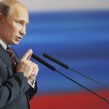
The Composition of Putin’s Popular Front
Publication: Eurasia Daily Monitor Volume: 10 Issue: 123
By:

Earlier this month, on the official June 12 “Russia Day” holiday, President Vladimir Putin was nominated leader of the Popular Front. The Front was established in 2011 to supplement the traditional party of power, United Russia (UR). But at the same time, the Front was envisaged at its founding as more than just a political organization and intended to harness the power of civil activism to solve social problems. At his coronation, Putin said the movement aimed to “allow the people of Russia to set their own tasks and find solutions to them without becoming buried in red tape” (https://www.interfax.ru/russia/txt.asp?id=312048). The Front, described as a “social movement” assists in civil actions, such as safeguarding the environment (https://rsppdfo.ru/events/2011/06/29/narodnyj-front-eto-shirokaya-obshestvennaya-koalic/) and protesting a motor rally in Bashkortostan under the slogan “we defend the land and water for future generations” (https://onf.ru/2013/06/06/e-kologicheskij-desant-onf-privodit-v-poryadok-reki-i-vodopady-bashkortostana/). The scope of the Popular Front’s actions clearly extend beyond politics, therefore.
According to reports, the movement’s stage manager Stanislav Gorovukhin asked the assembled members of the Popular Front: “‘Who shall we name as leader of our movement?’ and the room responded ‘Putin, Putin.’ ‘Shall we vote? Are there no other candidates? Vladimir Vladimirovich, I appoint you and approve’” (https://www.interfax.ru/russia/txt.asp?id=312048). The nominating committee was composed of some 55 people, including the three co-chairs of the movement, Gorovukhin, Alexander Sergeivich Galushka, and Olga Timofeeva.
Born in 1936 and the recipient of a host of awards for films he directed, Stanislav Gorvukhin is the most senior co-chair. He has been in the State Duma since 1993 and was also the chief of Putin’s re-election campaign in 2011–2012 (https://onf.ru/structure/rukovodstvo/hq/). Gorvukhin skillfully makes use of Putin’s narratives of reinvigorating Russia, in the past having criticized the “ideological dependence” resulting from the popularity of American films in the country (https://www.regnum.ru/news/1493941.html). Whereas, Alexander Sergeivich Galushka, born in 1975 and a former member of the economics faculty of Moscow State Social University, worked for the firm Key Partner and as a consultant before becoming vice president and then president of the Delovoi Rossii business organization. Galushka also worked on a number of social projects, including the “new industrialization” and “100 steps to improving Russia’s investment climate” (https://onf.ru/structure/rukovodstvo/hq/). He is a Professor at Moscow’s Higher School of Economics, a member of the Russian president’s council of experts, and sits on a number of government committees, including the committee to coordinate open government activities (chaired by Prime Minister Dmitry Medvedev) and the committee for electric energy (https://deloros.ru/main.php?mid=36&doc=19303). The youngest co-chair, Olga Timofeeva was born in 1977 in Stavropol and is a journalist who worked with the media outlet REN-Stavropol and became famous for her protests against illegal construction. She entered the regional parliament in 2008 (https://onf.ru/structure/rukovodstvo/hq/) before being elected to the State Duma on the United Russia list in 2011 (https://www.duma.gov.ru/structure/deputies/157072/).
The Popular Front was created in the run-up to the parliamentary elections of 2011 as an ostensibly apolitical organization. Nevertheless, UR deputy Oleg Ignatov described it both as a “new form of covenant between citizens and United Russia” and as a broad tent that would include “citizens of different social status, levels of prosperity, and in the first instance, conflicting ideological pretensions” (https://er.ru/news/2011/5/10/ignatov-narodnoj-front-modernizaciya-edinoj-rossii/). The Popular Front also has the support of Russia’s third-largest parliamentary party, A Just Russia. And over 2,000 leading Russian companies are included in the Popular Front, including Russian Railways, Opora Russia, and the Union of Industrialists and Entrepreneurs (rbth, June 18).
It is unclear where funding for the Popular Front comes from. No apparent means for making individual donations can be found on the Popular Front’s website (https://onf.ru/join/). Certainly, the involvement of the Front’s leadership in Russian business implies that the Front receives some funds from private donors—and Putin declared one of the goals of the Front to be protecting the rights of investors (https://onf.ru/2013/06/21/onf-dolzhen-obespechit-zashhitu-prav-potrebitelej-finansovy-h-uslug/). It is also likely that the Front receives support from the Russian state. Overall, however, the organization’s funding sources remain unknown.
The timing of the Popular Front’s creation—and Putin’s crowning as its leader—coincides with the Kremlin’s clampdown on non-governmental organizations (NGOs) funded from abroad and labeling them as “foreign agents.” This might lead one to speculate that the Front is an attempt to create a replica of civil society. In Sakhalin region alone, for instance, more than 50 supposedly independent organizations are now registered with the Popular Front (https://rsppdfo.ru/events/2011/06/29/narodnyj-front-eto-shirokaya-obshestvennaya-koalic/). As a result, one consequence of the Popular Front is the extension of the ruling United Russia party’s relevance into the daily lives of citizens, like in Soviet times.
But the Popular Front is also a more farsighted attempt by the Vladimir Putin to create a new basis of support for himself in preparations for a fourth term as president when his current term ends in 2018. Putin’s re-election would mean he would remain in the Kremlin until 2024. The Front’s political backing in achieving this outcome is, therefore, especially important given the fall in public support for United Russia. The party’s percent approval rating is currently in the mid-30s (https://www.levada.ru/19-06-2013/uznavaemost-partii-i-predvybornye-reitingi) and has been affected by the announcement of Sergei Sobyanin that he will seek re-election as Moscow’s mayor independently from the UR label. It remains to be seen whether the Popular Front will play any role in Sobyanin’s campaign. A further view sees the formation of the Front as an attempt to build unity in a fragmenting country with distinct ethnic territories. Whatever the ultimate truth, the Popular Front will be an interesting component of Russian politics for the foreseeable future.




